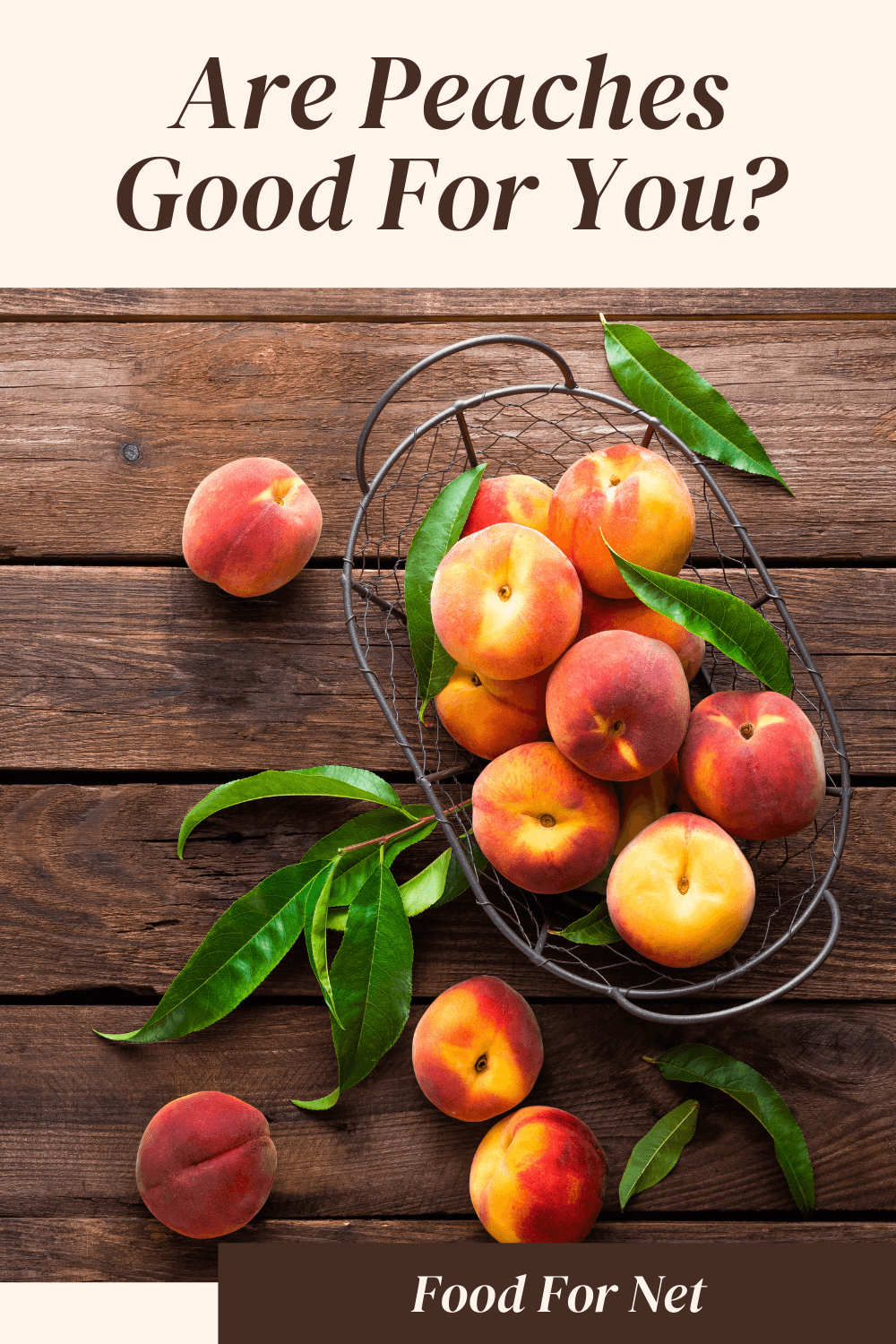
Peaches are a delicious fruit, one that’s fresh, vibrant, and perfect when the weather is warm. However, their sweetness might make them seem like a decadent treat, rather than a healthy snack. So, is that the case? Are peaches good for you?
Well… as with any fruit, there’s plenty going on to think about. Peaches provide you with antioxidants, nutrients, and some fiber, all in an easy-to-eat form. Then there’s the sugar to think about.
Before we delve into the benefits and issues though, let’s talk a little about peaches themselves. Peach trees come from the genus Prunus, which also contains many familiar fruits, including plums, apricots, and cherries.
Peaches are native to northwest China and they may have been cultivated since around 1000 BCE. Their long history is a testament to the deliciousness of the fruit. These days there are many different varieties, some of which are sweeter than others. All, however, share the benefits that we’re highlighting in this post.
Are Peaches Good For You?
- Nutritional Profile Of A Peach
- Benefits Of Peaches
- The Issues And Risks With Peaches
- Are Peaches Low In FODMAPs?
- Nectarines Versus Peaches
- Are Canned Peaches Healthy?
- How Do You Use Peaches?
- Final Thoughts
Nutritional Profile Of A Peach
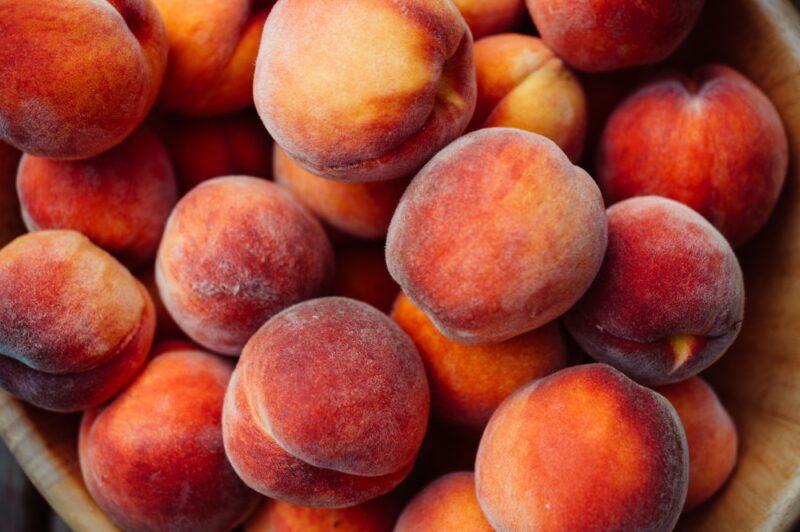
Before we talk about the benefits and risks of peaches, we need to look at their nutrient profile. After all, nutrients are essential for our health and foods vary dramatically in what they have to offer.
So, for a single large peach, we get this nutritional profile:
- Calories: 68.3
- Carbohydrates: 17.3 grams
- Fiber: 2.6 grams
- Sugars: 14.7 grams
- Protein: 1.6 grams
- Fat: 0.4 grams
- Vitamin C: 19% of your daily requirements
- Vitamin A: 11% of your daily requirements
- Potassium: 10% of your daily requirements
- Niacin: 7% of your daily requirements
- Smaller amounts of other nutrients, including vitamin E, vitamin K, magnesium, copper, and iron.
The figures are just rough estimates, of course. Exactly what you get will be influenced by the size of your peach and the variety, along with other factors, like how fresh it is, where it was grown, and even the time of year.
Regardless, the nutritional profile of peaches is about what you’d expect from fruit, as most of the calories come from sugars, while you’re getting relatively little fat and protein per serving.
Don’t be fooled by the nutrient quantities in this list. While the nutrient density might not look like much, remember that we’re talking about a single small piece of fruit.
Benefits Of Peaches
Useful As A Weight Loss Snack
Despite their sweetness, peaches can work surprisingly well for weight loss. After all, a large peach only contains 70 calories or so. Compare that to around 220 calories in a Hershey’s chocolate bar or 140 calories in a 12 oz. can of Coke.
Peaches are much more nutritious than those other options too, giving you a decent amount of fiber, antioxidants, and nutrients.
Then there’s the water. Peaches come in at around 88% water, making them one of the most water rich types of fruit. The combination of water and fiber is fantastic for weight loss, helping you to feel satisfied for longer. This effect may help to lower your cravings for sugary foods and perhaps even decrease your calorie intake.
Can Improve Your Digestion

Like most types of fruit, peaches are a decent source of fiber. Because fiber is so common, it often seems boring. Yet, it remains a critical macronutrient, one that influences health in countless ways.
The most noticeable impact is on digestion. Fiber helps to bulk out your stools, reducing the risk of constipation and keeping you regular. It can also help you to feel full, which is one reason why fiber rich foods are often fantastic for weight loss.
Choosing peaches instead of processed snacks would be an easy way to increase your fiber intake and improve your digestion. You’d be getting a decent amount of antioxidants and nutrients at the same time. What could be better?
Rich In Antioxidants
We can’t forget about antioxidants either. These important plant-based compounds are found in many fruits and vegetables – and help to decrease oxidative stress throughout your body.
This effect is incredibly important, as oxidative damage can harm our cells and even our DNA, potentially leading to disease. Getting plenty of antioxidants in our diet is one of the most powerful ways to keep oxidation at bay and decrease disease risk.
The various antioxidants all have other benefits as well. For example, some may improve the appearance of your skin, while many decrease inflammation.
May Protect Your Eyes
Peaches can be relevant for your eyes as well, due to a pair of phytonutrients called lutein and zeaxanthin. These help to protect your eyes from free radical damage.
They’re also thought to help with a range of eye-related conditions, including age-related macular degeneration and cataracts.
There’s still much to be learned about the ideal doses of lutein and zeaxanthin, along with whether you should be getting these in your diet or using supplements instead. Regardless, the lutein and zeaxanthin in peaches could easily offer benefits and certainly won’t cause harm.
Can Improve Your Heart Health
Peaches might help with your heart as well. The antioxidants are a key part of this equation, as antioxidants can decrease LDL oxidation.
The fiber in peaches is relevant as well, helping to keep your cholesterol levels in check. The nutrients in peaches help too, especially the potassium, which can decrease your blood pressure.
The Issues And Risks With Peaches
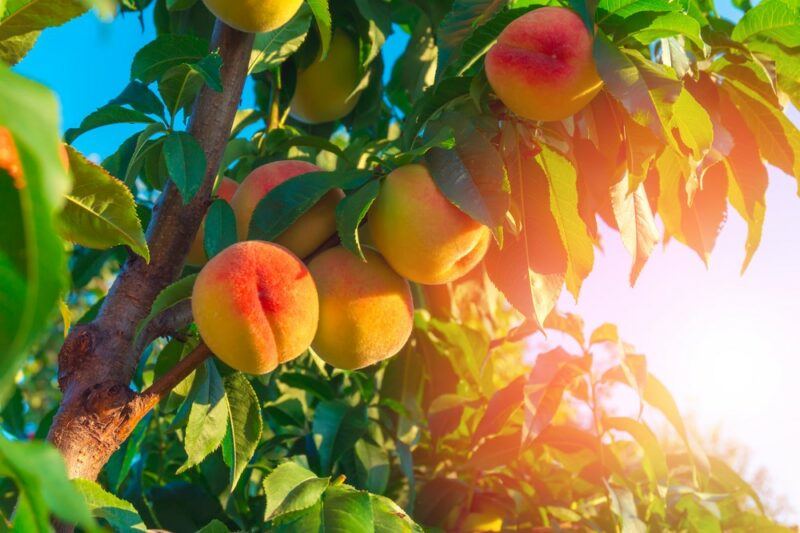
Pesticide Contamination
There’s an ongoing debate about pesticide levels on fruit, as some pesticide residues do remain on the surface of the fruits we buy, so we’re consuming pesticide residues regularly.
What does that mean for health? Honestly, we don’t know. Much more research is needed before we really understand the long-term effects of being regularly exposed to small amounts of pesticides. Perhaps there are no issues at all. Perhaps there are some serious ones.
This begs the question, though, why risk it?
Peaches are a particularly concerning fruit right now, as they rank 8th on EWG’s list of the 12 most contaminated fruits and vegetables. This isn’t a good place to be at all, meaning the pesticide levels are much higher than most other fruits.
Relying on organic peaches instead is an easy way to avoid these residues and any risk that they pose.
May Be Too High In Carbs
Peaches are relatively high in carbs, with a single peach containing roughly 12 net grams of carbs. This is still fewer carbs than you’ll find in a candy bar or many processed snacks, but it’s still a decent amount.
This carb content is far too high for most keto and low carb dieters.
Even people not following a low carb approach might need to be careful with peaches. After all, sugar intake adds up quickly. Most of us are already consuming more sugar than is good for us.
Are Peaches Low In FODMAPs?
FODMAPs can get confusing fast. The term refers to a group of fermentable sugars that can cause significant side effects for people with sensitive guts.
Two main types of FODMAPs show up in fruit – sorbitol and fructose. However, the effects of fructose can be mitigated somewhat by glucose, making the worst fruits the ones with excessive amounts of fructose compared to their glucose.
Some testing shows that peaches can be low in FODMAPs if you keep the serving size low enough (like 25 grams or 30 grams). However, other testing suggests that peaches are always high in FODMAPs, regardless of the serving size.
The FODMAP levels appear to be even higher for canned peaches than for fresh ones, making them a poor choice.
If you love peaches, you could always experiment with them. Try having small servings and see whether you get any side effects. After all, FODMAP sensitivity varies dramatically. Even people with irritable bowel syndrome can often enjoy some types of high FODMAP food.
Nectarines Versus Peaches
Nectarines and peaches look and taste much like each other. The biggest difference is that nectarine skin is smooth, while peach skin has a characteristic fuzziness.
Interestingly, while we think of peaches and nectarines as being different, they belong to the same species. The difference in the skin appears to come from a mutation.
Because the fruits are from the same species, you’ll get all the same benefits from nectarines that you get from peaches. So, if you’re focused on nutrition, either type of fruit works well. If you don’t enjoy the fuzziness of peaches, no worries, eat a nectarine instead.
Are Canned Peaches Healthy?
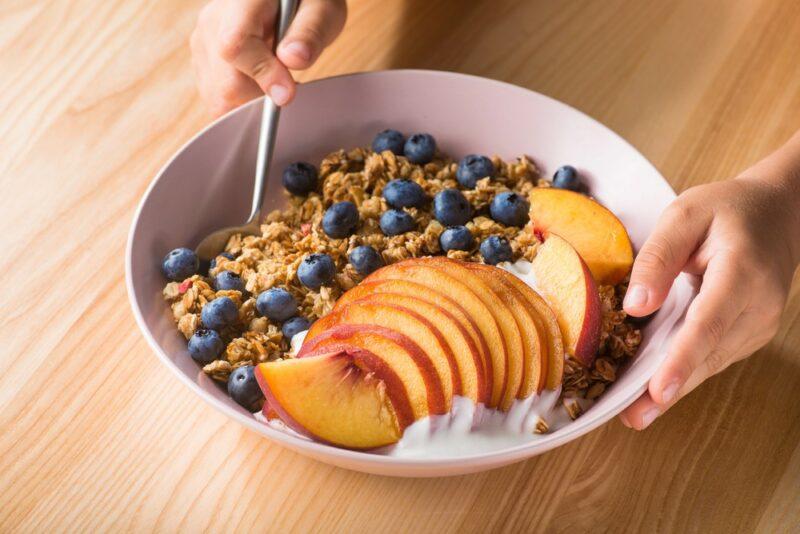
Canned fruit is often seen as much less healthy than fresh fruit. That makes sense, right? The canned version has been through much more processing and has probably lost nutrients along the way.
However, the real world is more complex than that.
In practice, canned fruit is often highly nutritious, giving you many of the same vitamins and minerals as the fresh version. Sometimes canned fruit might even be better, as it is processed soon after harvest, while fresh fruit takes a while to get to the store and then to your home.
The biggest concern is actually the can lining, as this often contains BPA, which can leach into your food. The impacts of this on health are often heavily debated, with regulators and manufacturers tending to say that the BPA levels are very low and safe, while many consumers are deeply worried.
Thankfully, some companies are listening to these concerns and are avoiding BPA in the lining of their cans. Plus, if you’re only using canned peaches every so often, the BPA might not be a big deal.
If you ignore the BPA, then canned peaches may be just as nutritious as their fresh counterparts. They’re a little easier to digest too, making them useful for people with sensitive guts.
Still… there’s much that we don’t know about canned foods, so it’s best to focus on fresh peaches when they’re available and just use canned ones when fresh peaches aren’t an option.
How Do You Use Peaches?
Peaches are simple enough as a snack on their own. Just wash them, then bite into them. That’s all there is to it.
Of course, eating peaches fresh is just the tip of the iceberg. There are plenty of other ways to use peaches too, ranging from the simple to the complex.
If you’re willing to do a little work, peaches are particularly good in desserts like pies and cobblers. The vibrancy of the fruit really shines in these desserts, giving you a taste experience that you won’t soon forget.
To make your peaches even better, why not grill them? Doing this gives the peach a somewhat smoky flavor and caramelizes the sugar. Then you can slice the peaches and use them as part of a salad or alongside some ice cream.
There are plenty of other options too, like making a chilled peach soup, using peaches as part of a delicious cocktail, or making peach chutney. If all else fails, take a quick look online or in cookbooks. You’re certain to find many delicious recipes to play with.
Final Thoughts
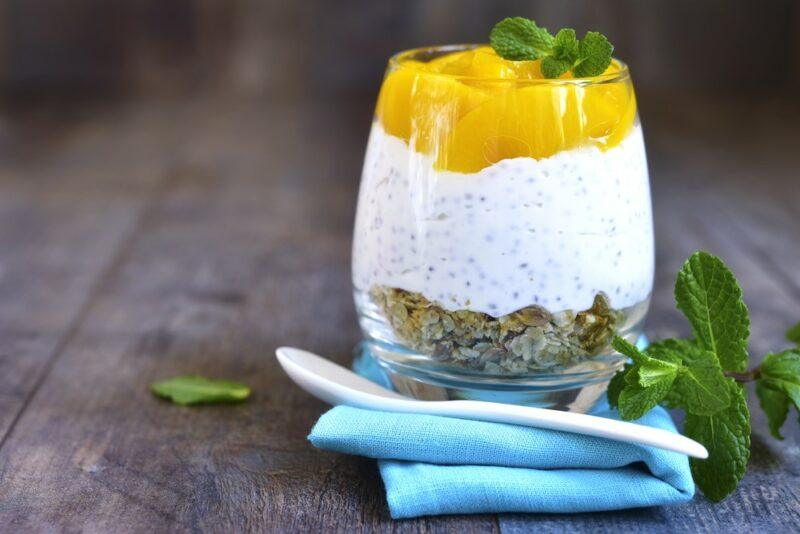
Like most types of fruit, peaches are delicious and are packed with important nutrients and plant-based compounds. They contain a decent amount of sugar too, but as long as you don’t overdo it, the benefits of peaches far outweigh the sugar content.
Besides, there are so many amazing ways to use peaches, like grilling them or using them to make a peach cobbler. What could be better?
Frequently Asked Questions
Can You Eat Peach Skin?
Yes. Peach skin is entirely edible and even provides plenty of fiber and nutrients. The biggest potential issue is pesticides. Buying organic peaches helps here, as pesticide use is much more restricted for organic produce.
You can also wash the fruit thoroughly before you consume it. This won’t completely remove any pesticides, but will still help.
Are Peaches Acidic?
Peaches have a pH of somewhere between 3.3 and 4, which does make them acidic. However, they’re less acidic than some other fruits and may still be okay for people with acid reflux. If you’re uncertain, try starting with a small serving and see how your body responds.
Are Peaches Keto Friendly?
A medium peach contains around 15 grams of carbs, 2 grams of which come from fiber. This gives you 13 net grams of carbs for a whole peach. Those carbs would be difficult to fit into daily keto targets.
However, while peaches aren’t a great keto choice, the keto diet doesn’t completely exclude many foods. You can still eat peaches if you can make the carbs work. This might involve using a few slices of peach as part of a dessert, rather than eating a whole peach or cutting down your carb intake elsewhere.
How Many Calories Are In A Peach?
The calorie content of a peach varies depending on size, with a small peach containing around 51 calories, while a large peach is closer to 70 calories instead. Either way, the calorie content is relatively low for such a delicious snack.
Are Peaches Good For Diabetics?
Despite the sugar content, peaches are excellent for diabetics. The nutrients, fiber, and antioxidants they contain can all promote health and reduce the risk of diabetic complications. Peaches even have a relatively low glycemic index (GI) of 28.
Of course, peaches can still spike your blood sugar, so it’s important to enjoy them in moderation.

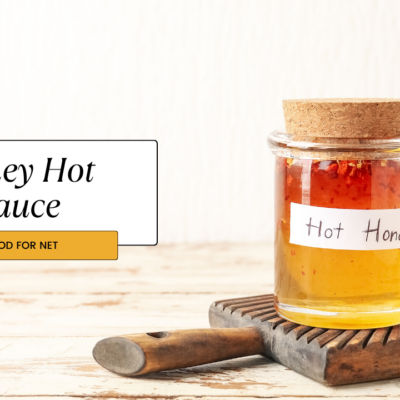



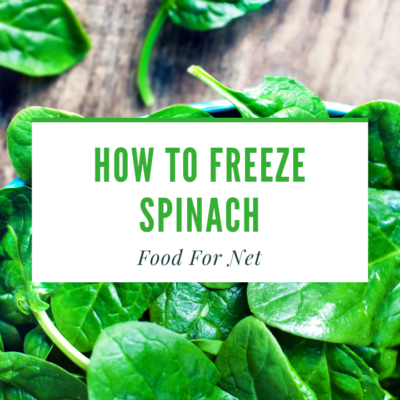
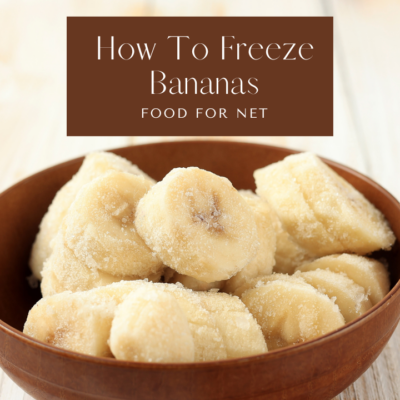
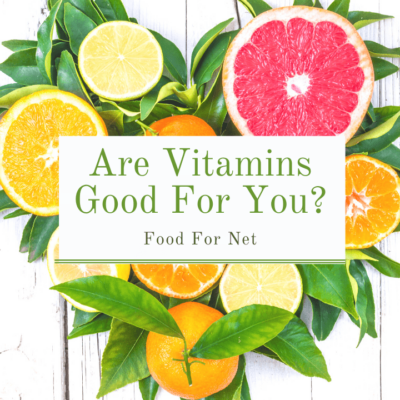








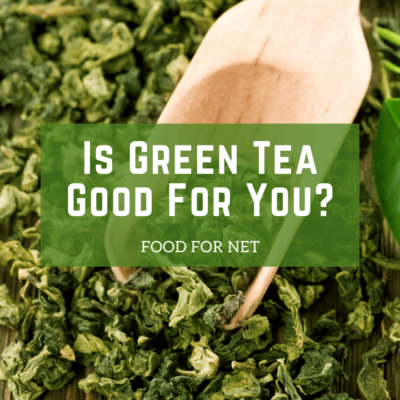
 Is Coconut Good For You?
Is Coconut Good For You?
Leave a Reply